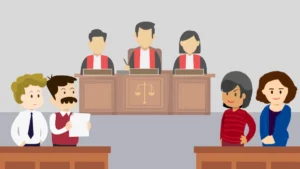In recent years, debt recovery in the UK has undergone significant changes, driven by new regulations aimed at protecting consumers and ensuring fair practices. Whether you’re an individual or a business seeking to recover unpaid debts, understanding these regulatory changes is essential for navigating the process effectively. In this blog, we will explore the key regulatory changes affecting debt recovery in the UK, how they impact both creditors and debtors, and the role of High Court Enforcement Officers (HCEOs) in the evolving landscape.
Debt Recovery in the UK
Debt recovery is the process of collecting unpaid debts from individuals or businesses that have failed to meet their financial obligations. This process typically begins with reminders and negotiations and can escalate to court action if the debt remains unpaid. Debt recovery in the UK is governed by various laws and regulations to protect both parties’ rights and ensure the process is transparent and fair.
With the changing regulatory landscape, debt recovery agencies and creditors must stay updated on new laws and guidelines to ensure compliance.
Key Regulatory Changes in UK Debt Recovery
Over the years, several important regulatory changes have been introduced that have reshaped the debt recovery process in the UK. Here are the key changes you need to be aware of |
1. The Financial Conduct Authority (FCA) Regulations
The Financial Conduct Authority (FCA) became the main regulator for consumer credit in the UK in 2014, taking over from the Office of Fair Trading (OFT). The FCA introduced a stricter regulatory regime, including the need for debt recovery agencies to be authorised and regulated by the FCA.
Debt collection firms are now required to adhere to the FCA’s rules on |
- Treating customers fairly
- Providing clear and transparent information
- Offering flexible repayment options
- Following strict communication guidelines to avoid harassment or undue pressure
This regulatory change ensures that debt collection agencies operate with a higher standard of professionalism and fairness when dealing with debtors.
2. The Pre-Action Protocol for Debt Claims
Introduced in October 2017, the Pre-Action Protocol for Debt Claims applies to any business (including sole traders) claiming payment from an individual (including sole traders). The aim of this protocol is to encourage early communication between creditors and debtors, resolving disputes without the need for court proceedings where possible.
Key elements include:
- A requirement for creditors to provide detailed information about the debt, including the amount owed, how it was calculated, and any previous payments.
- A 30-day period for the debtor to respond to the claim before legal action can be taken.
- A requirement for both parties to consider alternative dispute resolution (ADR) options before proceeding to court.
This change has increased transparency in debt recovery and provided debtors with more opportunities to settle disputes outside of court.
3. The Statute of Limitations on Debt
In the UK, there is a statute of limitations on certain debts, which means that creditors have a limited time to take legal action to recover a debt. Under the Limitation Act 1980, most debts become “statute-barred” after six years if no court action has been taken. This means that creditors can no longer take legal action to recover the debt, although the debt still technically exists.
For debts such as:
- Unsecured debts (e.g., credit card bills or personal loans) – the limitation period is six years.
- Mortgage debts – the limitation period is 12 years for the capital and six years for the interest.
Understanding the statute of limitations is crucial for both creditors and debtors. Creditors must act within the appropriate timeframe, while debtors should be aware that they may not be legally required to repay a debt if it is statute-barred.
4. Debt Respite Scheme (Breathing Space)
Introduced in May 2021, the Debt Respite Scheme, commonly known as Breathing Space, provides individuals with temporary relief from creditor action while they seek advice and support for managing their debts. There are two types of breathing space:
- Standard Breathing Space | This lasts for up to 60 days and prevents creditors from taking action to recover the debt during this period.
- Mental Health Crisis Breathing Space | For individuals receiving mental health crisis treatment, this provides additional protection for the duration of their treatment and 30 days afterwards.
The introduction of Breathing Space offers individuals in debt a vital opportunity to get back on track without the immediate pressure of debt recovery actions, giving them time to seek professional advice and support.
5. The Impact of COVID-19 on Debt Recovery
The COVID-19 pandemic led to temporary regulatory changes in debt recovery, with the UK government introducing measures to protect individuals and businesses struggling with debt during the crisis. Enforcement action, including evictions and repossessions, was paused during the height of the pandemic, and payment holidays were offered to many debtors.
As we move forward, creditors and debt recovery agencies must be mindful of the long-term economic impact of the pandemic and adopt a compassionate approach to recovering debts from individuals and businesses still facing financial difficulties.
The Role of High Court Enforcement Officers (HCEOs)
High Court Enforcement Officers (HCEOs) play a critical role in the debt recovery process, especially when a County Court Judgment (CCJ) is issued, and the debtor still fails to make payment. HCEOs have the authority to enforce judgments issued by the High Court, which often includes seizing assets or repossessing property to recover the debt.
At Shergroup, Claire Sandbrook, our CEO, has a wealth of experience in the field of debt recovery and High Court enforcement. Many will recognise her from her appearances on TV shows such as “Can’t Pay? We’ll Take It Away!” and more recently “Call the Bailiffs | Time to Pay Up.” Her expertise gained from these programmes informs her approach to High Court enforcement, ensuring that Shergroup remains at the forefront of best practices in this complex field.
New Regulations Impacting High Court Enforcement
Recent changes in regulations have also affected how HCEOs operate, ensuring that enforcement actions are carried out with more oversight and fairness. For instance, guidelines now require HCEOs to give notice of their intent to visit a debtor, allowing time for the debtor to settle the debt or make arrangements. There are also stricter rules in place to protect vulnerable debtors, ensuring they are treated with care and respect.
The role of HCEOs in the debt recovery process is crucial in recovering larger debts or enforcing complicated court judgments. With the right expertise and a thorough understanding of the regulations, HCEOs like those at Shergroup ensure that creditors receive what is rightfully theirs while adhering to the law.
Why Choose Shergroup for Your Debt Recovery Needs?
If you’re facing challenges with debt recovery, whether as an individual or a business, Shergroup is here to help. We have years of experience navigating the complex landscape of UK debt recovery regulations and can guide you through every step of the process.
Our team of experts, led by Claire Sandbrook, is well-versed in the latest regulatory changes and how they impact debt recovery. We stay up to date with the most recent developments in UK debt recovery law, ensuring that we can provide the best solutions for our clients.
At Shergroup, we specialise in:
- High Court enforcement services
- County Court Judgment enforcement
- Debt recovery for businesses and individuals
Whether you need help recovering a debt, enforcing a court judgment, or navigating the latest debt recovery regulations, we are here to assist you.
If you’re looking for expert advice or assistance with your debt recovery needs, don’t hesitate to contact Shergroup. Our team of experienced professionals is here to help you recover what is owed to you in a fair, legal, and efficient manner. Get in touch with us today at www.shergroup.com or call us directly to discuss your situation.
You can reach us |
By Phone | 020 3588 4240
Website | www.shergroup.com and you can chat to us from here
Email | [email protected]
Facebook | Check out Shergroup on this channel and message us
Twitter | Check out ShergroupChat on this channel and message us
LINKEDIN | Check out Shergroup’s LINKEDIN – and please FOLLOW us!
Instagram | Check out ShergroupChatter and
YouTube | Check out Shergroup YouTube Channel – and Subscribe to Our Channel!
Google My Business | https://maps.app.goo.gl/J1pUNBKfFv2SVnjQ6





